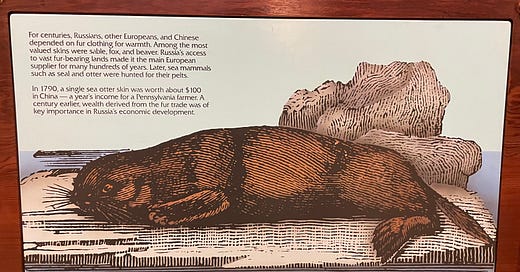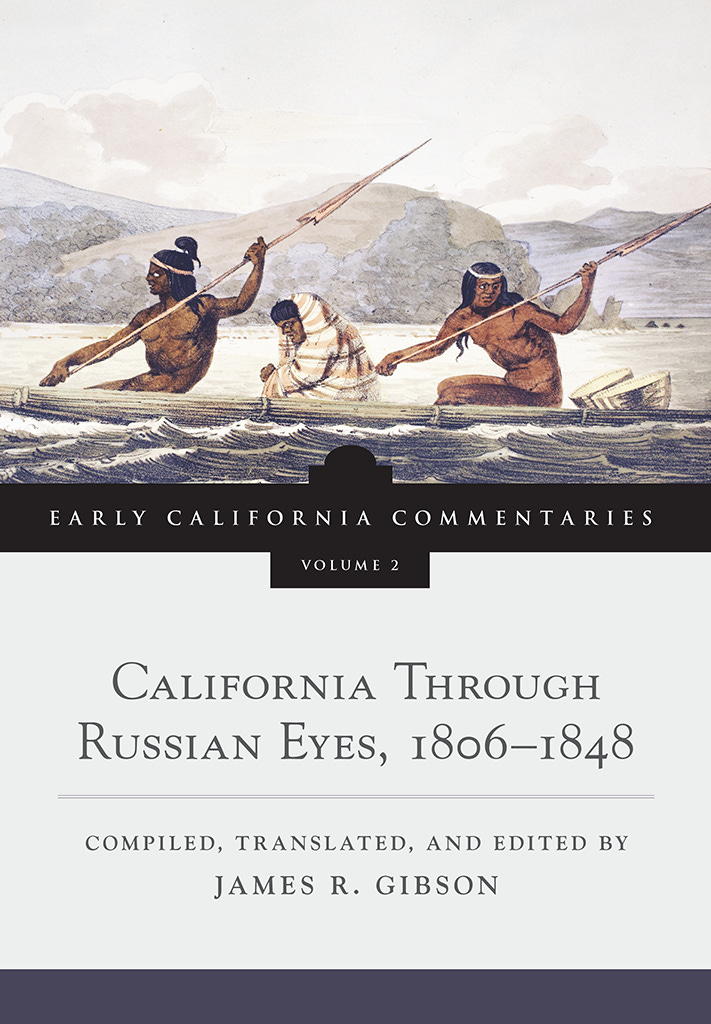One more thing about the last ep we recorded — the part where we talk about Fort Ross. What I find interesting about that place, aside from dumb accusations that it’s all part of some kind of Russian soft power plot, is that sitting in all that natural beauty, amid redwoods and dramatic cliffs overlooking the north coast of California, the fort is basically a monument to ecocide.
It was all about fur.
Because of the insatiable global demand for fur — coming not just from Russia, but the bottomless desires of massive European and Chinese markets — militarized Russian trappers and hunters, with aid from the local tribes that they had more or less easily conquered in the name of the Czar, began to expand east…all the way east until they hit the west coast of North America. En route, they wiped out all the commodifiable “fur-bearing” animals, hunting them to extinction. In Alaska and down the coast into California, sea otters proved to be the most valuable commodity.
Why? Because sea otters have the densest fur found in nature. For instance, a single otter carries hundreds of cats worth of fur on their rather small bodies. As Monterey Bay Aquarian explains:
Unlike other marine mammals, the sea otter doesn’t have a thick layer of blubber. To stay warm in chilly ocean waters, it wears the world's densest fur — at its thickest, this two-layer fur is made up of more than a million hairs per square inch. For reference, you've probably got 100,000 hairs or less on your whole head, and a cat has 600,000 hairs on its entire body!
Mining this “soft gold” to the max, the Russians very quickly hunted sea otters almost out of existence. Populations have still barely recovered. There are thought to be only around 3,000 of them left, although you can see them pretty regularly off the coast of California.
How valuable were these sea otters? Well, according to the museum in Fort Ross, a single otter skin in the 18th century brought in as much as farmer in Pennyslvania made in an entire year. That’s a lot of cash for Russia — and most of the gold and silver that it got from foreign countries in exchange for this fur came from the New World. So it was a clean circle: new world biological plunder paid for by New World mineral plunder.
What I didn’t quite connect in my head until reading up on this history was how early this extinction drive started happening. I was surprised to learn that by the time Peter the Great took power and began warring with the Swedes and the Ottomans for naval access to Europe, Russians had already trapped and hunted to extinction most of the high-value furry animals in Russia’s newly conquered eastern lands — thousands of miles from Russia’s western center. So the push to go beyond Russia’s far east to find unexploited territory began then, after Russia exterminated its own animals.
This history is nicely summed up in the introduction to a great book I have that collects a bunch of Russian documents from Russia’s failed attempts to colonize northern California — California Through Russian Eyes, compiled and translated by James R. Gibson. My buddy Rowan gave it to me as a gift.
Here’s how it lays it out:
Siberias chief source of wealth for the Russian conquerors (apart from the southern strip of arable land for runaway and deported serfs from European Russia) was not salt or hard gold but “soft gold” — furs, especially lucrative sables, which were hunted and trapped by Russian promyshlenniks with the state exacting a percentage of their take in taxes, as well as fur tribute from the natives.
Thanks to the high value of sables (upon which Siberia had a virtual monopoly), the ubiquitous navigable river network, the weak opposition from the disunited, scattered, and backward natives (once the Tatar khanate of Western Siberia had been defeated, at least), and the lack of intervention on the part of China or Japan, Russian entrepreneurs advanced very rapidly from the Ural Mountains to the Pacific Coast (a distance of some 2,500 miles in about fifty years), hunting out and trapping out one river basin after another as they went.




